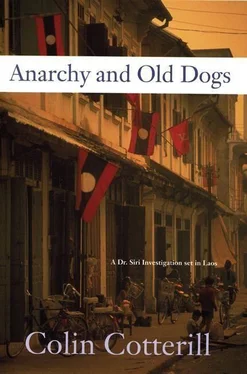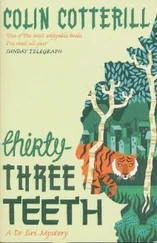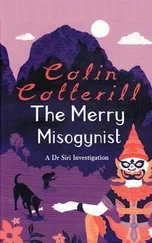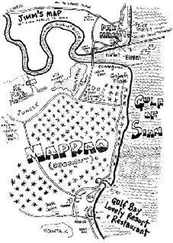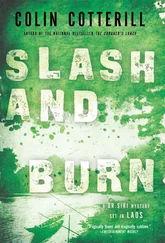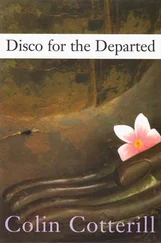Colin Cotterill - Anarchy and the Old Dogs
Здесь есть возможность читать онлайн «Colin Cotterill - Anarchy and the Old Dogs» весь текст электронной книги совершенно бесплатно (целиком полную версию без сокращений). В некоторых случаях можно слушать аудио, скачать через торрент в формате fb2 и присутствует краткое содержание. Жанр: Криминальный детектив, на английском языке. Описание произведения, (предисловие) а так же отзывы посетителей доступны на портале библиотеки ЛибКат.
- Название:Anarchy and the Old Dogs
- Автор:
- Жанр:
- Год:неизвестен
- ISBN:нет данных
- Рейтинг книги:3 / 5. Голосов: 1
-
Избранное:Добавить в избранное
- Отзывы:
-
Ваша оценка:
- 60
- 1
- 2
- 3
- 4
- 5
Anarchy and the Old Dogs: краткое содержание, описание и аннотация
Предлагаем к чтению аннотацию, описание, краткое содержание или предисловие (зависит от того, что написал сам автор книги «Anarchy and the Old Dogs»). Если вы не нашли необходимую информацию о книге — напишите в комментариях, мы постараемся отыскать её.
Anarchy and the Old Dogs — читать онлайн бесплатно полную книгу (весь текст) целиком
Ниже представлен текст книги, разбитый по страницам. Система сохранения места последней прочитанной страницы, позволяет с удобством читать онлайн бесплатно книгу «Anarchy and the Old Dogs», без необходимости каждый раз заново искать на чём Вы остановились. Поставьте закладку, и сможете в любой момент перейти на страницу, на которой закончили чтение.
Интервал:
Закладка:
So here they were, dressed in their simplest clothes with no possessions other than a small pack containing hurriedly collected paperwork. The house documents and wedding certificate had belonged to Phosy and his wife. Phosy had been an agent of the Pathet Lao long before the communists moved into Vientiane. With the takeover complete, he’d been sent to the northeast for specialist training and to reassure his employers that the soft life in the Royalist capital hadn’t distorted his ideals. He’d maintained his cover identity in Vientiane and pretended he was being sent for reeducation. When he returned to his home six months later, his wife and children were gone. She’d taken them across the river with no word of apology. He’d heard nothing from her since. After eighteen months of hoping she might come back or get in touch, he filed for divorce on the grounds of desertion.
Now Dtui was to take the woman’s name and become the wife of a temple craftsman, a carver of teak door reliefs. It would provide them with the perfect cover: a career frowned upon by the agnostic socialist authorities. He was an ideal candidate to seek refugee status in Thailand, and Dtui had all the makings of a typical wife.
“You’re going to have to get over this, you know?” Dtui said, her feet dangling in the refreshing river water. “We have to get into our roles soon.”
“Don’t tell me how to do my job,” he said, ripping the bark off an innocent sapling.
“You’re in a mood.”
“So what? We’re a married couple, aren’t we? This is what marriage is like.”
“I’m sorry.”
“Now what?”
“If your marriage was like this… Well, it’s a shame, that’s all.”
He clammed up again.
They were at a spot forty miles downriver from what used to be the ferry crossing between Savanaketh and Muk-daharn. It had closed when the Thais blockaded Laos to prevent socialism from seeping into their country. But eight hundred miles of Mekhong River served as a border between the two, and short of filling it with oil and setting light to it, the Thais knew they could never really police the banks of the river. Phosy and Dtui sat in a spot that was nowhere in particular on the Lao side, directly opposite nowhere in particular in Thailand. It was ideal for discreet crossings. Local entrepreneurs had set up a lucrative business to take advantage of the already disadvantaged. For an extortionate fee they’d row refugees across to where a truck would pick them up and drive them to a main road. Then they were on their own.
Had Phosy been by himself, he would have swum across and saved the money. Dtui was a nonswimmer. On the bus ride he’d suggested someone her shape should be able to float across. He’d immediately regretted saying it but wasn’t about to apologize. Dtui, for her part, had ignored him and pretended to sleep most of the way south.
They both looked up when they heard the splashing of oars. It was so dark they didn’t spot the skinny craft until it had almost passed them. The oarsman couldn’t see them at all.
“Anyone there?” he called.
“Over here,” Phosy said. The pilot steered the long boat toward the bank and crashed against the rocks. It was all he could do not to overbalance into the water. His thick, greasy spectacles slipped down his nose.
“Are you sure you’ll be able to find Thailand, brother?” Phosy asked.
The oarsman laughed. “No problem. I just row toward the smell of money I know I’ll hit it eventually.”
Getting Dtui into the craft wasn’t an easy matter. She refused to let the men touch her. It wasn’t until they were both standing in the water, holding onto the gunwales to stop the boat from rocking, that she managed to lower herself onto the narrow wooden seat. There she sat, holding her breath and looking directly ahead. The men climbed in and they headed off. It was no more than a three-minute boat ride, and like all good businessmen, the oarsman waited until they were midstream and completely at his mercy before revising the fare.
“This is where you pay,” he said. “Thirty thousand kip.”
Phosy laughed. “Don’t give me that,” he said. “I could buy the state ferry for that.”
“That’s the price, brother. Take it or leave it. It includes the truck pickup on the other side. If you don’t pay up, we turn back.”
“We don’t have that much with us,” Dtui told him.
“Yeah, they all say that.”
“Is that so?” Phosy asked. He edged closer to the man. Dtui felt the boat rock perilously for a second or two, then heard Phosy’s voice as a menacing whisper floating on the water.
“I’m sure you can feel what’s pressed up against your neck,” he said. “Either you take us across for the fee we agreed on in Savanaketh, or I slit your gullet from ear to ear. Do they all say this as well?”
“Yeah,” said the oarsman. “Some of ‘em say that.”
“And?”
“And I tell ‘em it’s twenty thousand.”
“Good.”
The oarsman’s cousin looked undernourished and smelled of fish. He had a beaten-up pickup truck that crunched and putted its way from the river along a dirt track. He drove with the headlights off, somehow negotiating the narrow trail by the illumination provided by the dim cab light above his head. He tried to impose a petroleum surcharge but he didn’t put a great deal of effort into it and wasn’t too disappointed when Phosy told him to take a hike.
“Some of the rich ones just hand it over without a fuss,” he said. “You can’t blame me for asking.”
The driver eventually reached a paved road, swung left, and turned on his headlights. They didn’t do a much better job of illuminating the road than the overhead light. They soon passed a signpost in Thai that said UBON RACHATHANEE EIGHT-FIVE KILOMETERS. Most literate Lao could read Thai script. Phosy knew they wouldn’t make it as far as Ubon. He wondered where the driver planned to let them off to make their own way to the city, and he didn’t have to wait long for an answer. Three miles from the sign, a well-lighted border-patrol police hut loomed up ahead. Jutting into the road was a red sign that told vehicles to HALT TO CHECK but there was nobody around to force them to stop. They could have kept going, but the cousin slowed down.
“What the hell are you doing?” Phosy asked, reaching for the gear stick, but the truck was already coming to a stop.
“No problem, brother,” the cousin said. “All’s normal. Just have to stop here for a second.”
He rolled onto the gravel in front of the hut and beeped his horn. From the rear a man appeared, digging a toothpick between his gappy teeth. As he passed the hut he reached in and produced a fearsome-looking M16 assault rifle. He was followed by a second man, this one in uniform, who’d already shouldered his weapon. There was no urgency in their movements. It was just another night at work. They walked to the truck, leveled their guns at the passenger window, and motioned for the latest batch of refugees to get out.
“Come on, both of you,” one said. “Don’t try anything. You’re under arrest. Come out with your hands in the air.”
It was a flat non-emotive rendition that Dtui guessed the man had given every night that week and for many months before. As she and Phosy were climbing out of the truck, the second guard went around to the driver’s window and handed him a small brown envelope.
“Thanks, Dim,” he said. “How’s the wife?”
“Still a pain in the arse.”
Dtui could hear the laughter behind them as she and her “husband” were marched at the end of a gun into a small unlit shed.
“Well, damn it, stop them then.”
“Can’t! The telegram got here after they’d left already.”
Читать дальшеИнтервал:
Закладка:
Похожие книги на «Anarchy and the Old Dogs»
Представляем Вашему вниманию похожие книги на «Anarchy and the Old Dogs» списком для выбора. Мы отобрали схожую по названию и смыслу литературу в надежде предоставить читателям больше вариантов отыскать новые, интересные, ещё непрочитанные произведения.
Обсуждение, отзывы о книге «Anarchy and the Old Dogs» и просто собственные мнения читателей. Оставьте ваши комментарии, напишите, что Вы думаете о произведении, его смысле или главных героях. Укажите что конкретно понравилось, а что нет, и почему Вы так считаете.
